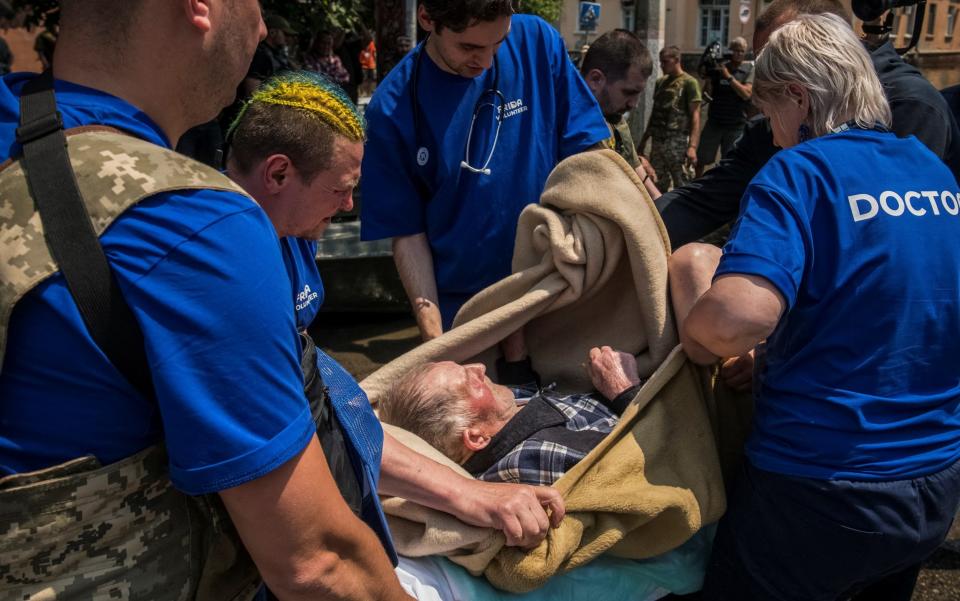Ukraine dam disaster risks contamination from sewage and rotting carcasses

A “plague” of rotting animal carcasses, contamination from cemeteries, and sewage could lead to serious disease outbreaks in flood-hit areas of Ukraine, health officials have warned.
The destruction of the Kakhovka hydroelectric dam sent 4.8 billion gallons of water cascading across the war zone of southern Ukraine on Tuesday. Russia and Ukraine have traded blame for the attack, which has forced tens of thousands to leave their homes.
Several hundred tonnes of oil were washed into the Dnipro river, while groundwater sources are believed to have become polluted. The reservoir had provided clean water to 700,000 people.
The Ukrainian health ministry has told locals not to consume water drawn from wells and ground pumps, as is common in rural areas of Ukraine.
“Ongoing damage to water infrastructure, and damage from the dam blasts means that communities may turn to alternative drinking water sources due to lack of access to safe water. This increases the risk of common diarrheal diseases like shigella and norovirus,” said Ruwan Ratnayake, an epidemiologist working on public health in humanitarian crises.

The World Health Organization has also confirmed that cholera – a serious diarrheal illness caused by people drinking water contaminated with cholera bacteria – could be a risk given the pathogen exists in the environment.
“The impact of the region’s water supply sanitation systems and public health services cannot be underestimated,” Tedros Adhanom Ghebreyesus, the WHO Director-General said.
“The WHO has rushed in to support the authorities and health care workers in preventive measures against waterborne diseases and to improve disease surveillance.”
‘Catastrophic’ impact
Olivia Mary Headon, from the International Organization for Migration in Ukraine, warned the “post-flood period” will be particularly risky.
“When people return home, and once the floods have receded, they will possibly go back to using water sources that used to be clean but are now contaminated. The flooding has brought different contaminants like dead fish, dead animals, and other toxic substances,” she told The Telegraph.
“The longer-term impact is going to be a lot more catastrophic.”
Maksym Soroka, an environmental safety expert at the Dovkola Network NGO, told the Financial Times that he expected an “epidemic of intestinal infections”, adding: “The situation in the occupied territories of the left bank of the Kherson region is even worse. People have no access to medicine and no way to escape this catastrophe. And there is nothing we can do to help them.”
On Thursday, Ukraine’s President Volodymyr Zelenskiy called the collapse of the Kakhovka dam a global problem, as severely contaminated waters are now flowing into the Black Sea.
Mr Zelenskiy said the flood waters have brought with them sewage, oil, chemicals and possibly anthrax from animal burial sites.
“At least two anthrax burial places are in the temporarily occupied territories,” Zelenskiy said. “What is happening to those sites we do not know yet.”
“The poisoning and contamination coming from the flooding area goes to the groundwater almost immediately, poisoning rivers and then the water basin of the Black Sea,” he said. “So it’s not happening somewhere else. It is all interrelated in the world.”
A WHO spokesperson told the Telegraph the flooding has put even greater pressure on the public health system.
“Since February 24 and the Russian Federation invasion, we have seen people without electricity, more than one thousand attacks on healthcare facilities, we have lost healthcare workers, we still need to do vaccination catch-ups. Now we need to pay attention to waterborne disease,” said Jarno Habicht, WHO spokesperson for Ukraine.
“We have very intensive weeks and months ahead.”
Protect yourself and your family by learning more about Global Health Security

 Yahoo News
Yahoo News 
